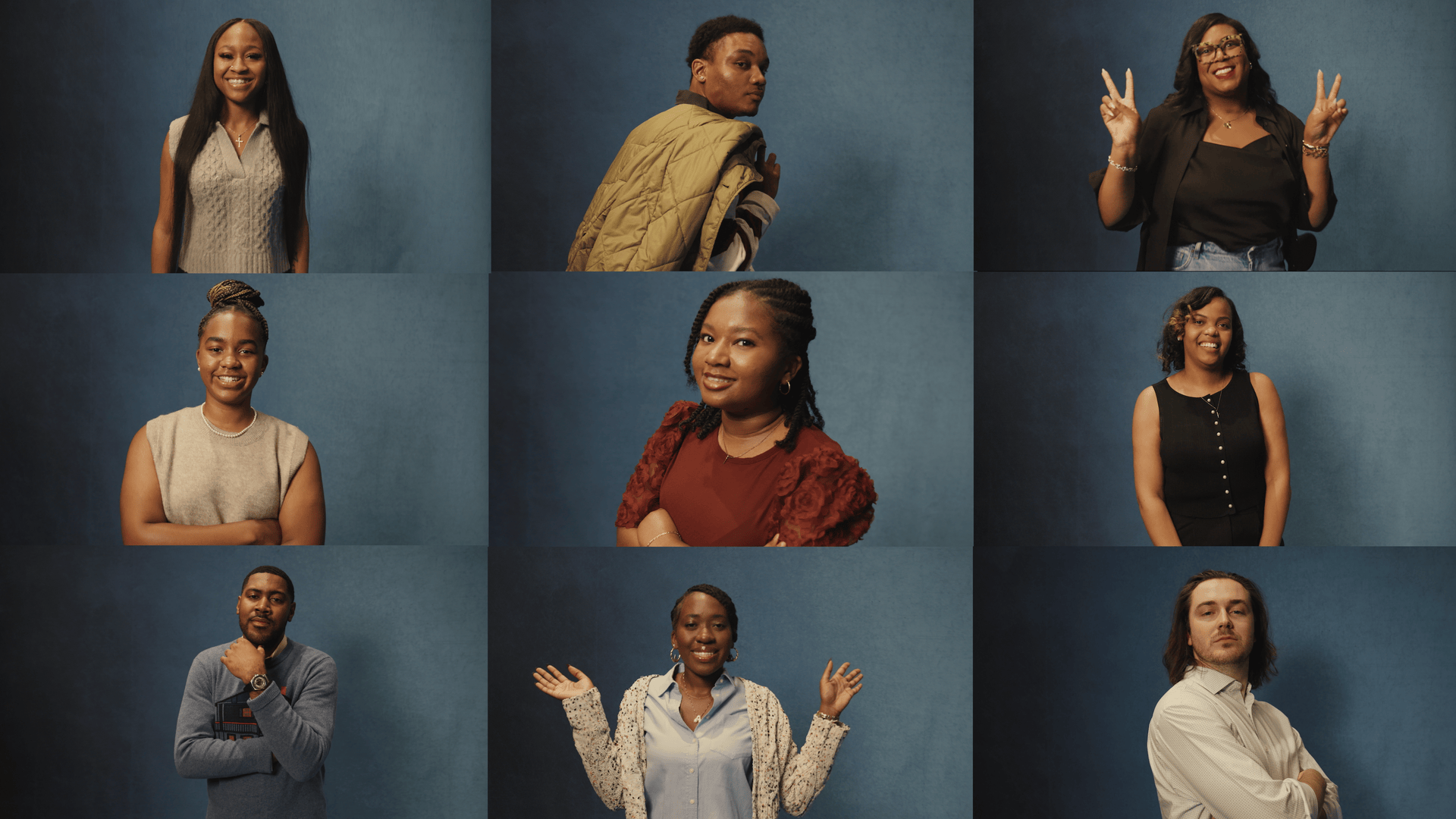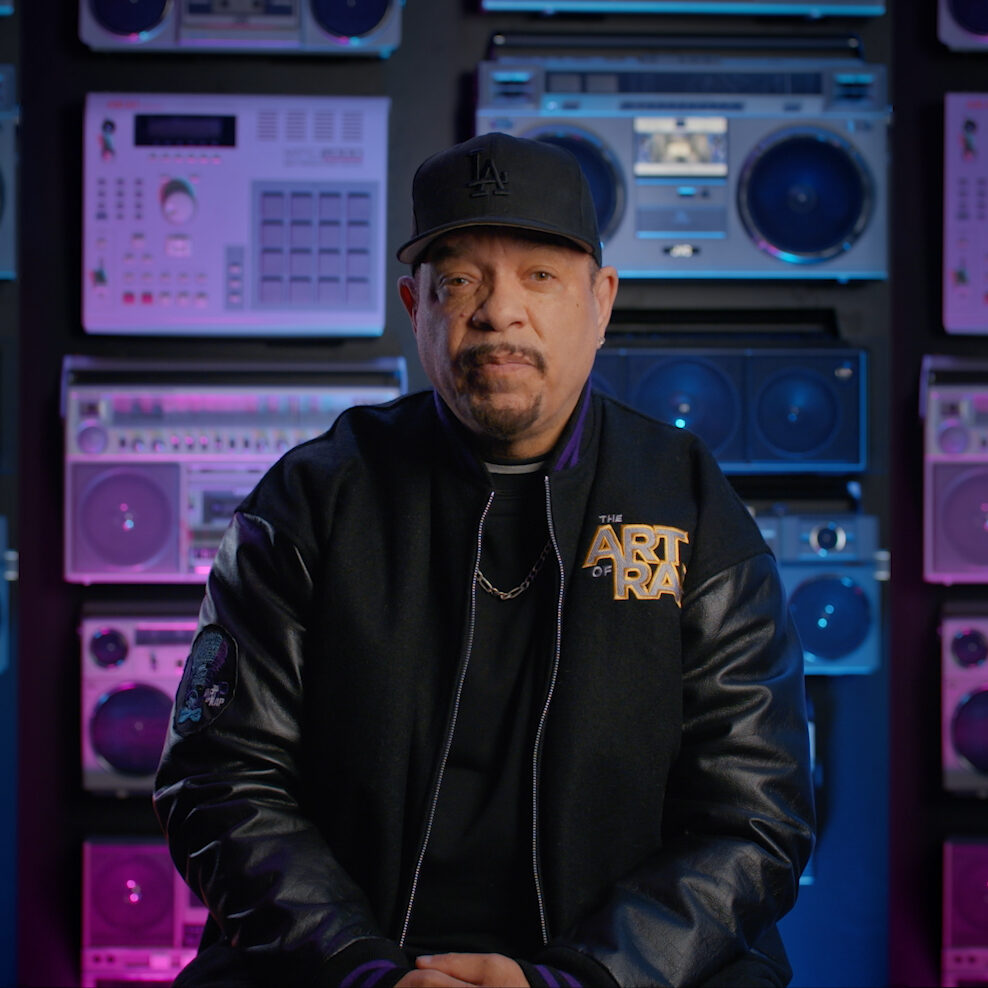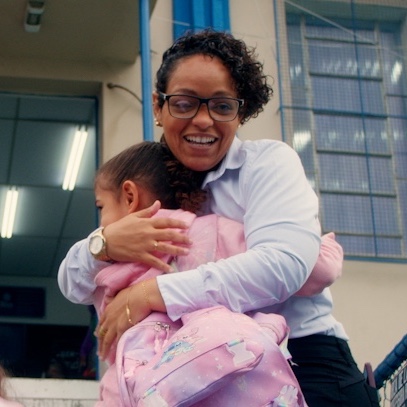A new generation takes the mic
The urgency of Coretta Scott King’s message of justice, equity, and love feels more relevant than ever. In a world still grappling with the same challenges she devoted her life to confronting—racism, poverty, and militarism—her vision of the “Beloved Community” remains both a reminder and a rallying cry, urging us to fight for a world where compassion leads and justice prevails. But what does it mean to carry a vision born during the Civil Rights Movement forward today, in a world still yearning for progress?
For a group of college students, this question became deeply personal. Inspired by Mrs. King’s teachings and equipped with modern tools, they created ReThink: The Special Series, a podcast from The King Center created in partnership with Spotify and Microsoft. The podcast brings together conversations with the students’ peers and interviewees, amplifying Mrs. King’s legacy while addressing the pressing challenges of their generation.
“Coretta Scott King’s life and legacy teach us that the seeds we sow in our young minds now have the potential to create real change,” said podcaster Ann’gel Lewis, graduate student at Georgia State University. ”Her dedication to her passions, even with limited resources at the start, and her resilience in the face of adversity are inspiring.”
To bring their vision for ReThink to life authentically, the students leaned on an unexpected collaborator in their creative journey: Microsoft Copilot. From organizing workflows to distilling complex ideas into clear, engaging narratives, the AI-powered assistant supported them in ensuring every episode stayed true to Mrs. King’s powerful message while speaking directly to a modern audience.


After Dr. Martin Luther King Jr.’s assassination, Mrs. King carried his legacy forward, advocating for nonviolence, justice, and equality. Her work on the Poor People’s Campaign, her leadership in the National Committee for Full Employment, and her dedication to The King Center demonstrated her resilience and purpose.
ReThink co-host Majeste Graves, graduate of Fayetteville State University, admires Mrs. King’s ability to turn grief into action: “Faith in the Beloved Community is the central purpose of her legacy,” said Graves. “‘When heartbreak knocked on my door, I had to learn to let faith answer.’ This phrase reflects the optimism Mrs. King needed to continue honoring her husband and nurturing her ‘fifth child,’ The King Center.”
For co-host Tomia Zongkazih, Mrs. King’s life offered an example of strength and purpose. “Even though ‘the world seemed to have lost its color’ when her husband was assassinated, she found strength in using it as a driving force to confront the challenges of carrying on his legacy,” she said.
For Hamilton, Mrs. King’s commitment to nonviolence and compassion offers a guiding principle for addressing today’s challenges. “In a world rife with conflict and division, her message resonates deeply, advocating for dialogue and understanding over hostility,” he shared.
These and other reflections formed the foundation of ReThink, guiding the students as they set out to reimagine Mrs. King’s timeless message, while leveraging AI to navigate its modern complexity. As Lewis explained, “One of the most significant advantages of using Copilot was how it made the process easier for us as first-time podcast creators. It helped transform our ideas from mere concepts to reality.”
For me, Copilot feels like a collaborative partner rather than a computer tool. Its responsiveness allowed me to focus more on the overarching themes and emotional depth of my content, rather than getting bogged down in the minutiae of language or structure.
A new generation speaks
Each episode of ReThink explores what Dr. Martin Luther King Jr. called the “triple evils” of racism, poverty, and militarism—a framework amplified by Mrs. King. Blending historical context with contemporary insights, the students addressed these themes with clarity and purpose, supported by Copilot to distill complex ideas and craft engaging narratives.
“Using Copilot for ReThink has been a game-changer,” said Graves, who noted how it elevated the podcast’s overall quality, efficiency, and creativity. “Additionally, Copilot’s ability to assist with tasks such as editing, transcribing, and organizing narrative has streamlined the workflow, allowing the team to focus on more creative aspects.”
Zongkazih called Copilot “an indispensable asset,” noting its ability to refine interview questions to ensure discussions felt intentional, setting a high standard for ReThink episodes.
Where do we go from here?
Through ReThink, the students ensure that Mrs. King’s voice continues to inspire, challenge, and empower. Their work goes beyond honoring her legacy; it amplifies her vision, using innovative tools like Copilot to build a bridge between the past and the future.
“Through Coretta Scott King’s teachings, we learn that progress is possible when love leads the way,” said Zongkazih, capturing the heart of the students’ mission.
Wolfe reflected on the journey, saying, “We weren’t just creating a podcast. We were crafting a conversation that honors Mrs. King’s legacy while addressing the pressing issues of our time.”
Hamilton added, “Her legacy reminds us that our collective efforts, driven by love and justice, pave the way for a more inclusive and equitable future.”
ReThink is more than a tribute—it’s a reminder that progress requires collaboration, compassion, and an unwavering commitment to justice. Mrs. King’s torch burns brightly in their hands, lighting the way for us all.
Play the episodes
Episode 1
Racism—Art as a catalyst for change
In the first episode, the students, with guests from Atlanta’s ZuCot Gallery and The Hip Hop Museum in the Bronx, NY, examined racism through art and storytelling, drawing connections to Mrs. King’s use of Freedom Concerts to inspire change.
“The arts create opportunities for people to empathize with experiences unlike their own, breaking down barriers and fostering understanding and compassion,” said co-host and undergraduate student at Morehouse College, Tre’von Henderson. “They provide a platform for the expression of diverse voices, particularly those that have historically been marginalized or silenced.”
Building on this, the students emphasized how Mrs. King’s approach to storytelling continues to inspire. “Providing platforms for diverse stories is how we begin to dismantle stereotypes and generalizations,” shared Graves. “Creating a more inclusive community is part of the vision of the Beloved Community.
Episode 2
Poverty—The intersection of justice and the environment
The second episode, featuring Dr. Joi Orr, Assistant Professor of Christian Ethics at the Interdenominational Theological Center in Atlanta, delves into poverty, focusing on the relationships between environmental justice and systemic inequities.
The conversation examines how environmental inequities deepen poverty in marginalized communities and sheds light on Mrs. King’s work in addressing poverty through policy as co-chair of the National Committee for Full Employment and the Full Employment Action Council. “She believed that society holds a moral responsibility to support the poor and marginalized, emphasizing that unemployment is often blamed on individuals when it’s a systemic issue driven by tax breaks and low wages,” said Graves, reflecting on Mrs. King’s perspective.
Drawing from Mrs. King’s work, the hosts emphasized how solutions to poverty must address systemic inequities. “Mrs. King powerfully addressed poverty as a critical issue intertwined with racism and discrimination, ” added co-host Catalino Maldonado, undergraduate student at Gwinnett College. “She emphasized that society holds a moral responsibility to support the poor and marginalized.”
Episode 3
Militarism—Nonviolence as a counterforce
In the final episode, the students examine militarism and its broader implications, from domestic violence to global conflict, and draws on Mrs. King’s commitment to nonviolence as a solution. “Her advocacy for social change was rooted in a profound understanding of our interconnectedness,” notes co-host Ky Hamilton. “Reminding us that the fight against militarism is also a fight for economic justice, gender equality, and environmental sustainability.”
The students discussed the importance of proactive peacebuilding, inspired by Captain Charles Alphin’s work in teaching Kingian nonviolence. “Nonviolence is not merely the absence of violence; it is the presence of justice,” added Hamilton. “It is an active and dynamic force that challenges the structures of militarism and oppression.”









